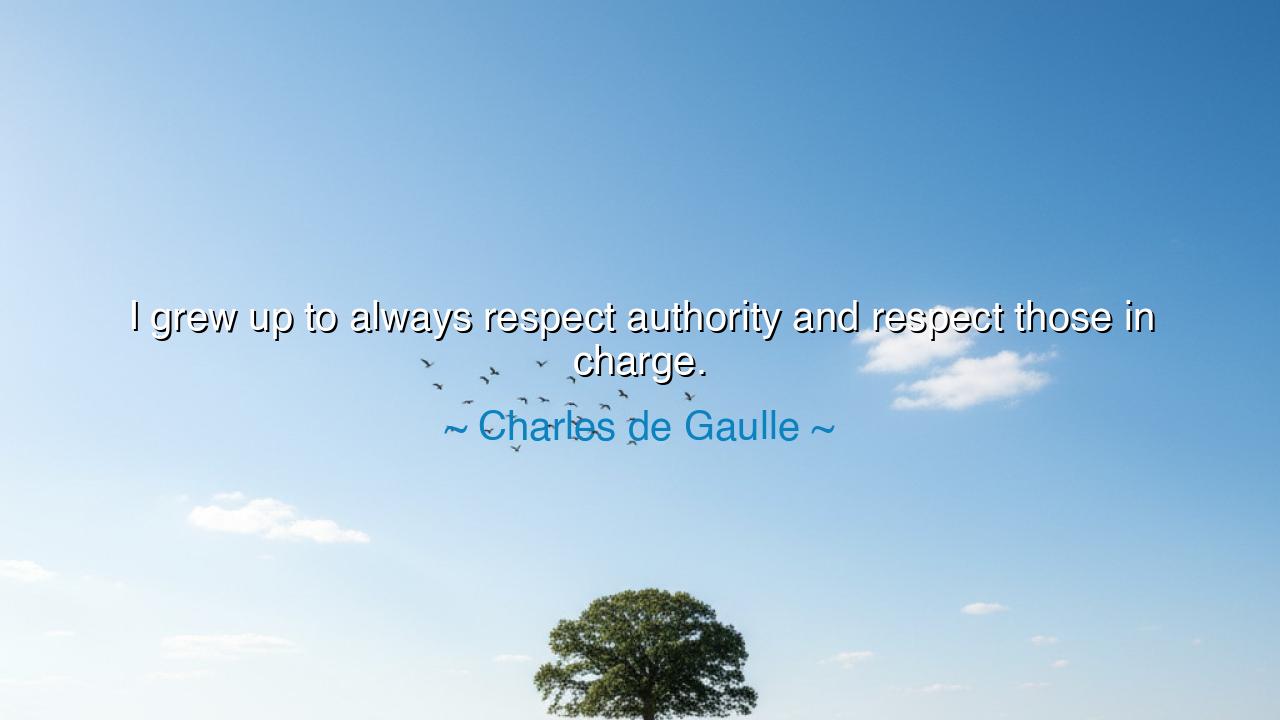
I grew up to always respect authority and respect those in






In the words of Charles de Gaulle, the great general and statesman of France, there echoes a principle as old as civilization itself: “I grew up to always respect authority and respect those in charge.” These words, simple yet solemn, speak of the foundation upon which order, discipline, and greatness are built. To respect authority is not to submit blindly, but to acknowledge the sacred order that binds man to man, leader to follower, and society to its ideals. In these words we hear the echo of ancient wisdom — that no nation, no army, no household can endure without reverence for structure, for guidance, for the responsibility of those who lead.
De Gaulle, forged in the fires of war and duty, knew the meaning of command. He was not a man of idle obedience, nor a servant of tyranny. Rather, his respect for authority was born of understanding — that every structure of power, rightly guided, is not a chain, but a pillar. As a child, he was raised among teachers, priests, and patriots; from them he learned that leadership is both a privilege and a burden. To respect authority was, for him, to respect the weight of that burden — to honor the courage it takes to decide when others hesitate, to bear the blame when others falter.
In the crucible of World War II, this belief would be tested. France had fallen; its leaders had surrendered; its armies scattered. Yet from the ashes, De Gaulle rose — not as a rebel against order, but as its rightful guardian. He spoke from London, declaring that France still lived, that its spirit could not be signed away by men of weakness. In that hour, he defied authority in the name of true authority — the moral kind that stands above titles and offices, the authority of conscience and duty. Thus, his respect for command was not servile obedience, but disciplined wisdom — the ability to discern when loyalty to principle outweighs loyalty to power.
There is a story told of De Gaulle during those dark years. One night, as bombs fell over London, a young aide asked him, “General, how do you bear the loneliness of command?” He replied, “By remembering that authority is not about being obeyed. It is about being worthy of obedience.” Such was the heart of his belief — that respect must be earned through integrity, and that to lead is to serve. For the respect of authority is not the reverence of fear, but the recognition of virtue.
This wisdom is as true today as it was in his time. To respect those in charge is to acknowledge the order that allows society to flourish — in the family, in the school, in the nation. Yet it is also to understand that those who command are but stewards, not masters. The worker respects the leader, but the leader must first respect the people. Authority and obedience, like the sun and the earth, exist in mutual balance; when one forgets its place, harmony turns to chaos.
The ancients knew this well. In the Roman legions, every soldier learned to obey without question, for the army’s strength was unity. Yet the greatest generals — men like Scipio and Caesar — also listened to their soldiers, knowing that respect must flow both ways. A commander who ruled through fear found only silence behind him; a commander who ruled through respect found hearts willing to follow him into the fire.
Thus, the lesson of Charles de Gaulle is not a call to blind submission, but a call to disciplined honor. To the young, it teaches humility — that before one can lead, one must learn to follow. To the powerful, it teaches accountability — that authority is not a throne, but a trust. And to all, it teaches that order, when built on respect, becomes not a prison but a fortress of peace.
So remember this, my children: Respect authority, but question it with wisdom. Honor those in charge, but hold them — and yourselves — to the higher standard of truth. For when respect and righteousness walk hand in hand, nations stand firm, families thrive, and the world moves forward in harmony. As De Gaulle lived and proved, the noblest form of power is not domination, but the dignity that commands respect by the virtue of its example.






AAdministratorAdministrator
Welcome, honored guests. Please leave a comment, we will respond soon